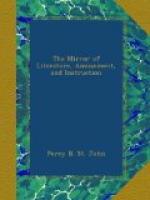Upon a jutting crag, below the height
Where stands the royal city
in its pride,
The ark is rested! in the people’s
sight
The priests and Joshua standing
by its side;
Awhile the chief the sea of battle eyed,
Which heaved beneath:—in
accents undismayed,
“Sun, stand thou still on Gibeon!”
he cried,
“And thou, O Moon, o’er
Ajalon be stayed!”
And holiest records tell the mandate was
obeyed.
Look on the horrid conflict; mark the
stream
Of lurid and unnatural light
that falls,
Like some wild meteors bright terrific
gleam,
On Gibeon’s steep and
battlemented walls;
Her royal palace, and her pillared halls,
Seeming more gorgeous in its
vivid blaze!
While o’er proud Lebanon the storm
appals,
In jagged lines the arrowy
lightning plays,
Soften’d to Israel’s sight
by intervening haze.
But o’er the Amoritish camp the
cloud
Bursts in its fury! on the
race abhorred
The parting heavens, as from a pitchy
shroud.
Their desolating hail-storm’s
wrath out-poured,
More vengeful in its ire than Israel’s
sword!
Thus was deliverance unto
Gibeon shown;
And by the fearful battle of the Lord,
The army of the Amorites o’erthrown,
And the almighty power of Israel’s
God made known.
Made known by marvels awfully sublime!
Yet far more glorious in the
Christian’s sight
Than these stern terrors of the olden
time,
The gentler splendours of
that peaceful night,
When opening clouds display’d, in
vision bright,
The heavenly host to Bethlehem’s
shepherd train,
Shedding around them more than cloudless
light!
“Glory to God on high!”
their opening strain,
Its chorus, “Peace on earth!”
its theme Messiah’s reign!
Bernard Barton’s New Year’s Eve, &c.
* * * * *
MAKING ACQUAINTANCE.
What could be more natural than for Mr. Jackson to say to Dr. Smith, “I am going to call on Markham?” And what could be more natural than for Dr. Smith to say, “I will go with you, and you may introduce me?” So then Markham’s friend, Jackson, leaves his card, and Jackson’s friend, Dr. Smith, leaves his card too.—Rank and Talent.
* * * * *
GENTLEMEN’S FASHIONS.
We read much of the luxurious effeminacy of the old Romans, their fantastically curled hair, their favourite robes, &c.; but what will posterity think of some of the modes of puppyism in our times, when they read in a chronicle of fashion, dated 1829, that gentlemen wore elegant drab cloth opera manteaux lined with scarlet velvet, and confined at the collar with a gold chain! In another dress, the waistcoat is directed to be made of “a very beautiful white




